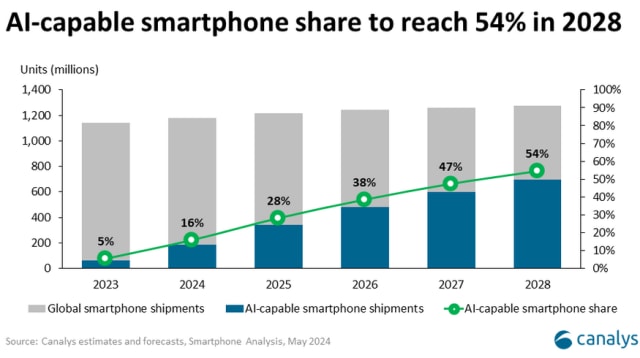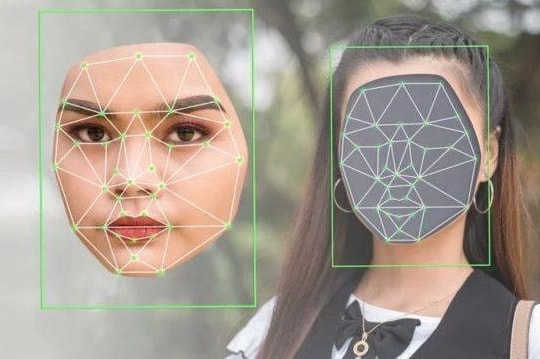Smartphones with integrated artificial intelligence will account for 54% of the global market by 2028
According to a forecast by Canalys, a reputable market analysis company, the number of AI-integrated smartphones will account for 54% of the global market by 2028, a sharp increase from 16% in 2024.
This is a breakthrough, marking a major change in the way we use smartphones. With AI capabilities, phones will become smarter, more useful and able to meet all the needs of users.
The AI-enabled smartphone segment is expected to grow at a compound annual growth rate (CAGR) of 63% between 2023 and 2028, according to Canalys. This growth is driven by consumer demand for advanced features such as AI assistants and on-device processing capabilities. This shift is expected to first occur in flagship smartphones, and then gradually spread to mid-range models.

Top Smartphone Makers Are Integrating AI Into Their Devices
The world's leading smartphone maker Samsung from South Korea, when announcing its financial results for the first quarter of 2024, said that the AI features on the Galaxy S24 - the company's first AI-powered smartphone - maintained a high usage rate and contributed to expanding sales.
Samsung also revealed that it will expand the AI experience to other high-end phones to maximize the competitiveness of the product. Samsung aims to strengthen communication with customers about the AI features of the S series and continue to invest in developing AI features on the Galaxy series.
According to Canalys, global smartphone giants such as Apple, Google, Samsung, along with leading Chinese brands such as HONOR, OPPO, Xiaomi and Vivo are leading the way in integrating AI features into their devices.
Xiaomi recently said that the share of premium smartphone shipments will account for 21.7% of its total smartphone shipments in the first quarter of 2024. Xiaomi has revealed plans to enhance AI-driven user experience by focusing on the premium segment.
Accordingly, Xiaomi is developing a series of smartphones that combine smartphones and the Internet of Things (IoT), powered by AI. Simply put, these are smartphones that are capable of connecting and interacting with other IoT devices in the home or office, while using AI to process data and make smart decisions, automating tasks.

Leading smartphone vendors also have different development strategies, from developing proprietary AI chips to enhancing ecosystem integration that leverages AI to improve user experience. These developments are technical and strategic, requiring significant investments in hardware and software to maintain a competitive advantage.
The report says that several core hardware capabilities are needed to define an AI-enabled smartphone. Specialized processors such as application-specific integrated circuits (ASICs), graphics processing units (GPUs), and other components need to be optimized to efficiently run AI models and workloads on the device.
As technology advances, software and service capabilities will play an increasingly important role, differentiating AI smartphones not only by their hardware but also through their ability to seamlessly integrate and update AI-driven functions.
On-device AI integration opens up revenue opportunities beyond traditional smartphone sales. On-device AI enables new business models, including subscription services for advanced AI features, personalized advertising, and advanced app functionality that leverage on-device processing. These models diversify revenue streams and drive deeper customer engagement by delivering improved, continuously personalized user experiences.
Factors Leading to the Explosion of AI-Integrated Smartphones
There are many factors leading to the explosion of AI-integrated smartphones, including:
Growing consumer demand for advanced features:Users want smartphones that understand them better, support them better, and help them get things done more efficiently. AI can meet all of these needs.
The strong development of AI technology:Thanks to advances in machine learning and artificial intelligence, smartphone manufacturers can integrate AI into their devices more easily and efficiently.
Reducing the cost of AI chips:The cost of AI chips is falling, making it more common to integrate AI into smartphones.
The Impact of AI-Integrated Smartphones
The explosion of AI-enabled smartphones will have many huge impacts on users, including:
Changing the way we use smartphones:AI-enabled smartphones will become personal assistants, helping us do everything from booking appointments to managing finances.
Improve work and study efficiency:Integrating AI into smartphones can help us work more efficiently, learn faster, and remember information better.
Create new and exciting experiences:Integrating AI into smartphones can open up new possibilities for mobile applications, providing users with new and exciting experiences.
The future of AI-enabled smartphones is very promising. With the continuous development of AI technology, smartphones will become smarter, more useful, and can change our lives in many different ways. In addition, clear information about data use, the functions of AI features, and compliance with privacy regulations are important to build consumer trust and acceptance.






